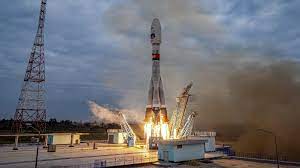A Failed Lunar Mission: Unveiling Challenges in Russia's Space Industry
The recent failure of Russia's lunar mission, Luna-25, has not only dealt a significant blow to the nation's pride but has also exposed underlying issues within its space industry. Intended to place a robotic spacecraft on the Moon's surface, the mission encountered a technical malfunction, forcing an abrupt termination of the launch on July 22. This event has triggered widespread criticism within Russia, where the space program is revered as an emblem of national prestige.
The Impact of Failure
The failure of Luna-25 carries profound implications, revealing the nation's actual level of technological advancement. As one Russian scientist lamented, "This setback underscores that our perceived technological prowess might not align with reality." The incident has further implications, shedding light on the deeper-seated problems within Russia's space sector.

A Struggle to Keep Pace
Russia's space industry has been grappling with the challenge of staying competitive against global leaders like the United States and China. The steady decline in technological innovation and advancements has put the nation at a disadvantage. In recent times, corruption scandals and mismanagement have compounded these issues, eroding the industry's credibility.
The Reputation Ramifications
The failure of Luna-25 not only affects national morale but also carries repercussions for Russia's standing within the global space community. The setback could potentially hinder the country's ability to attract foreign investments for its space ventures. The once-celebrated Russian space program's reputation is now at stake, underscoring the urgency for reform and revitalization.
A Legacy at Crossroads
Russia boasts an illustrious space history, marked by monumental achievements such as sending the first human into space. These achievements have shaped the space exploration landscape. However, this legacy has been under threat as the nation's space program continues to face challenges and setbacks. The failed Luna-25 mission serves as a stark reminder of the uphill battle Russia faces to maintain its status as a space superpower.
The Uncertain Path Ahead
The future trajectory of Russia's space program remains uncertain. The question looms: Can the nation recover from the jolt caused by the Luna-25 failure? The answer hinges on the willingness to address the root causes of the decline within the space industry. Reforms are imperative if Russia aims to preserve its role as a significant player in space exploration.
The unsuccessful Luna-25 mission reverberates beyond the immediate technical malfunction. It serves as a wake-up call, exposing the vulnerabilities and inadequacies plaguing Russia's space industry. While national pride has taken a hit, the event also presents an opportunity for the nation to embark on a journey of reform and resurgence. Addressing corruption, mismanagement, and technological lag will be pivotal for Russia to redeem its space program's legacy and shape a promising future in space exploration.
FAQs
1. What was the purpose of the Luna-25 mission? The Luna-25 mission aimed to land a robotic spacecraft on the Moon's surface, furthering Russia's exploration endeavors.
2. How did the failure impact Russia's national pride? The failure of Luna-25 tarnished Russia's reputation and pride in its space achievements, prompting widespread disappointment.
3. Are corruption scandals unique to Russia's space industry? No, corruption scandals have plagued various space industries globally, but Russia's recent mishaps have heightened concerns.
4. Can Russia regain its space superpower status? Yes, through strategic reforms addressing corruption, technological advancement, and mismanagement, Russia can revive its space industry's prominence.
5. What lessons can be learned from the Luna-25 failure? The Luna-25 failure emphasizes the importance of transparency, innovation, and effective management in sustaining a robust space program.
.png)
.png)
